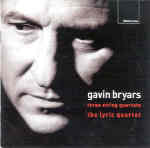When you enter the portals of Gavin Bryars’ first string quartet (composed in 1985/86), you’re initially struck by the music’s haunting minimalist rhythmic repetitions, fragile timbres based on the use of harmonics, and phrase lengths that refuse to conform to your symmetry-oriented expectations. The music grows quicker, more dynamic and harmonically complex as it progresses, only to wind down in a beautiful extended coda with highly affecting sustained harmonics. Bryars crystallizes these high-register experiments to more pronounced extremes in his 1990 Quartet No. 2, replete with weighty portamentos and little melodies that emerge from ostinatos and repeated chord patterns. The 1998 Third quartet’s starker parameters and virtually vibratoless aesthetic in part stems from the composer’s extensive work with early-music ensembles and instruments.
The Lyric Quartet’s lean, uniform sonority and proficient ensemble work well suits Bryars’ style, yet I find the Balanescu Quartet’s 1995 Argo recordings of the first two quartets more varied and robust in terms of tone color and expression. Compare, for example, first violinist Alexander Balanescu’s ardent shaping of the second quartet’s first big tune to Jonathan Carey’s relatively neutral, uninflected version with the Lyric Quartet. Or, in the same work, the Balanescu’s sharper accents in the chugging repeated chords next to the Lyric’s softer-grained reading. However, if you want all three Bryars quartets, the present disc has no competition.
































